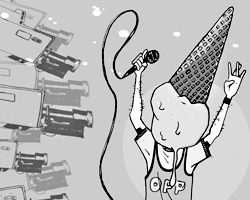Exploring whiteness in hip-hop seems to be a hot topic at the moment. The rip-roaringly funny first episode of VH1’s Ego Trip’s the (White) Rapper Show was certainly testimony to that. And later this month, Bloomsbury Press will release the book Other People’s Property: A Shadow History of Hip-Hop in White America by Jason Tanz, a senior editor at Fortune Small Business.
Tanz grew up in Tacoma, where, he writes, “[r]ough-hewn musical depictions of ghetto struggles seemed as hypothetical and threatening as an extraterrestrial invasion.” From Commencement Bay to Green Bay, and “Straight Outta Compton” to “Straight Outta CompUSA” (the latter one of Tanz’s own experiments in rap), the author roams the fields where white rappers and fans alike are cultivated. He explores the thrills, guilt, and escapism that the music and culture provide lighter-skinned listeners, as well as the evolution of his own comfort level with the subject.
Interestingly, there are connections between the book and the VH1 show: In Other People’s Property, Tanz profiles Jus Rhyme, a wiry white MC from Los Angeles who is one of the cable program’s contestants, and interviews two of the show’s five creators. Tanz even amusingly describes the 1989 version of 3rd Bass’ MC Serch—the (White) Rapper host —as looking like “the kind of kid I met at Jewish summer camp: Tubby, with thick glasses and a thinly concealed urge to be the center of attention.”
“I didn’t think I was white. I thought I was something else,” Serch tells Tanz in the book. “I honestly believed, in my heart of hearts, I was not white.”
From the premise to the set design to the execution of the game, Tanz says he loves watching (White) Rapper. But this isn’t reflective of a personal desire for white rappers to take over. He actually finds that prospect rather worrisome.
“I think a world has been created where you can be a white hip-hop fan and listen to only white MCs and go to concerts with white people and not really hear anything about what it’s like to be black, which is always a major part of what hip-hop was,” says Tanz. “I think a kind of alternate universe has been created where it’s possible to listen to hip-hop and avoid all the confrontation that hip-hop seems to promise.”
In Tanz’s book, Sacha Jenkins, one of the creators of (White) Rapper, echoes those sentiments: “In 10 years, it’s entirely possible that mainstream rap is 80 percent white. There is a real danger in white kids taking over hip-hop and not knowing where that shit comes from.”
Yet what’s beautiful about the VH1 program is that the history lessons the contestants learn from South Bronx legends like Grandmaster Flash will also be absorbed by viewers of all shades without embarrassment, since there’s a comedic foil—the white rappers—to overshadow what might actually be lack of historical knowledge on the part of the viewer.
Despite the presence of only a couple of promising candidates on (White) Rapper, the landscape for white rappers isn’t a bleak one. Locally, Macklemore may be Seattle’s greatest white hope. Ears should also be kindly directed to Seattle up-and-comer Yuns, whose flow actually sounds a lot more Dirty South than rainy Northwest.
None of this purports to say that the future of is all white. Just that the flavors therein are anything but vanilla.




